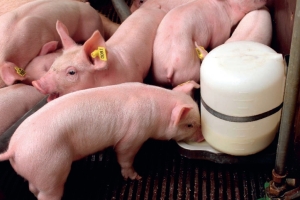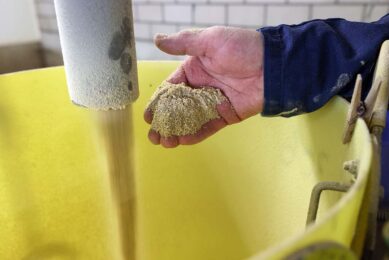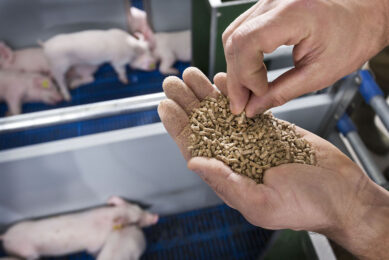Piglet feeding to better deal with E. coli and S. suis

Dutch animal nutrition company Denkavit has launched a special feeding programme, focusing on avoiding enteric diseases like E. coli and S. suis to occur in piglets.
The so-called ‘Safe Concept’ is built around feed with a lower than usual crude protein content, but with a very high digestibility. In this set up, there is less protein left for bacterial fermentation in the colon.
This in turn avoids the production of toxic elements like ammonia, produced through fermentation of indigested protein at the end of the small intestine. These could increase the permeability of the intestinal wall.
Ingredients
The concept also stands out through the addition of specific ingredients which delay gastric emptying rate. This results in a longer lasting effect of gastric enzymes and, as a consequence, improved protein hydrolysis tin the stomach. Furthermore, this delayed gastric emptying rate also results in a more gradual feed intake during the day.
There are also some additives to give piglets a safer performance. A carefully selected mix of organic acids (Denkacid), yeast cell walls and plant extracts helps to manage the microbiota and prevents pathogens like E. coli from attaching to the intestinal wall and producing toxins.
The acids are important for two reasons: lowering the pH in the piglet’s stomach and for their antimicrobial effect on mostly gram-negative bacteria. Piglets are unable to produce sufficient hydrochloric acid to lower pH to levels for optimal digestion in the stomach. Addition of for example fumaric acid lowers the gastric pH. At a lower pH pepsinogen will be more effectively converted into pepsin. Another advantage of this low stomach pH is the better barrier for pathogens.
Streptococcus suis
Recently, the company developed the new product: Denkacid XL to combat problems with S. suis: a combination of the organic acid mixture Denkacid and extra lipophilic (XL) compounds like medium chain fatty acids (MCFAs) enriched with lauric acid (C12:0).
Denkacid, Denkacid XL and also separate the mixure of MCFA’s were tested in a piglet simulation in vitro model at a laboratory in Finland. In this test, pathogenic bacteria like E. coli and Streptococcus suis had been added to the content of the small intestine of weaned piglets.
Both Denkacid and Denkacid XL were shown to have a strong dose-dependent growth inhibition on E. coli (Figure 1). However, only Denkacid XL showed an utmost significant reduction of S. suis at lower dosages (Figure 2). With this in vitro simulation study of the piglets’ gastro-intestinal tract it is shown, probably for the first time, that problems with S. suis can be tackled through a judicious use of feed additives. The fact that both pathogenic bacteria E. coli and S. suis could be suppressed offers great opportunities to raise piglets with less health problems and to reduce the amount of antibiotics used in pig production.
Figure 1. Effect of on number of E. coli bacteria.
** p<0,01; *** p<0,001 significantly different compared to the negative control group.
Figure 2. Effect of Denkacid on number of S. suis bacteria.
* p<0,05; ** p<0,01; **** p<0,0001 significantly different compared to the negative control group.
Application
Using this knowledge, two different feeding concepts have been created, focusing on the prevention of problems related to E. coli and S. suis. The safest product (Safe Start 1) will be fed when problems are occurring in the first week after weaning, like E. coli. Safe Start 2 is fed when these problems occur normally in the second or third week post-weaning, like with S. suis. The objective of both concepts is to reduce the occurrence of enteric problems in piglets after weaning resulting in less mortality and less antibiotics needed.
Related website:
• Denkavit
Join 18,000+ subscribers
Subscribe to our newsletter to stay updated about all the need-to-know content in the pigsector, three times a week. Beheer
Beheer










 WP Admin
WP Admin  Bewerk bericht
Bewerk bericht